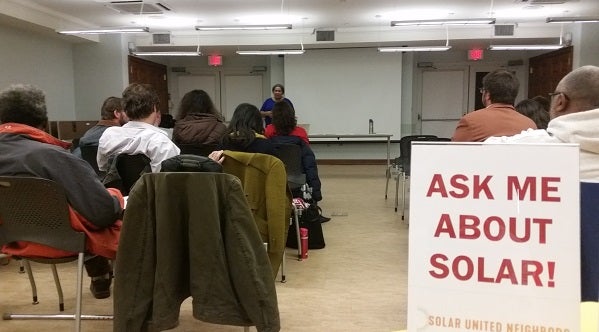51st State Solar Co-op releases RFP, announces info session

The 41-member 51st State Solar Co-op issued a request for proposals (RFP) today from area solar installers. The group members created the co-op to save money and make going solar easier, while building a network of solar supporters. As a DOEE-funded Solar for All project, this co-op also focuses on expanding access to solar to low-income households. Low- and moderate-income households qualified for the Solar for All grant funding from DOEE will have the cost of their solar arrays covered by the grant (via Solar United Neighbors) and a portion of the homeowner’s SREC income. Click here to learn more about the 51st State Solar Co-op, including some statistics from Round 1 of the co-op.
Solar for All, a program of the District of Columbia’s Department of Energy and Environment, seeks to provide the benefits of solar electricity to 100,000 low-income households and reduce their energy bills by 50% by 2032. The program, which was established by the Renewable Portfolio Standard (RPS) Expansion Amendment Act of 2016, is funded by the Renewable Energy Development Fund (REDF). For more information about Solar for All visit: http://doee.dc.gov/solarforall.
The group will host two information meetings to educate the community about solar and the co-op process on Tuesday, July 17th at 12:30 p.m. and on Thursday, July 19th at 6:30 p.m. Details are below:
Tuesday, July 17th
|
Thursday, July 19th
|
Local installers interested in serving the group can download the RFP here and response template here. All D.C. residents interested in joining the co-op can sign up at the co-op website.
Joining the co-op is not a commitment to purchase panels. Co-op members will select a single company to complete all the installations. They will then have the option to purchase panels individually based on the installer’s group rate. By going solar as a group and choosing a single installer, participants can save up off the cost of going solar and have the support of fellow group members and solar experts at Solar United Neighbors.
